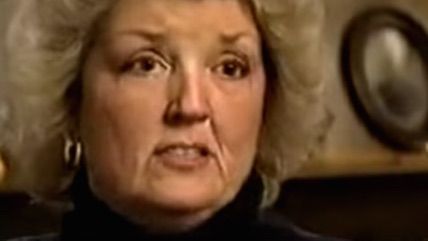On Rape, Liberals Don't 'Believe the Victim' If It's Juanita Broaddrick
The right and left reverse positions when a sexual assault accusation threatens Hillary Clinton.


In the wake of the publication of a major interview with Juanita Broaddrick, a lot of left-leaning writers are soberly re-examining her decades' old rape accusation against Bill Clinton—which seems to grow less plausible (or perhaps less important) in their eyes, the more it threatens Hillary Clinton's presidential bid.
"While I (sort of? am leaning toward?) believe Juanita Broaddrick, her characterization of Hillary Clinton sounds irrational, maybe induced from PTSD," writes Wonkette's Rebecca Schoenkopf. Schoenkopf deserves credit for admitting a startling truth: her tribe is generally much less likely than this to agonize over accepting the victim's narrative. "Why did Juanita Broaddrick change her story? ask people who otherwise would automatically answer 'rape survivors do that sometimes,'" notes Schoenkopf.
We need not try to imagine how left-leaning feminist writers would respond if someone else described an alleged rape survivor as sounding "irrational." People like Cathy Young, Richard Bradley, and me have been excoriated by sites like Wonkette, Jezebel, and Feministing for daring to scrutinize self-described victims.
Meanwhile, conservatives are fervently embracing Broaddrick, as is Donald Trump's campaign. Breitbart News described Broaddrick as "a highly-believable victim."
Indeed, if an alien were to visit the United States and survey opinions on the Broaddrick issue, it might well conclude that conservatives were generally inclined to believe sexual assault victims, whereas skeptical liberals generally preferred to tread cautiously.
Reality, of course, is the opposite. "Believe the victims," is the mantra of the feminist-left. It was even Hillary Clinton's position on sexual assault accusations—at least until people pointed out the irony of Hillary vowing to believe all women while very specifically disbelieving those who had accused her husband. Last February, after Broaddrick sent a tweet accusing Hillary of trying to silence her, the Clinton campaign deleted the following sentence from its website: "You have the right to be believed, and we're with you."
When Clinton was specifically asked at a campaign event last December whether she thought Broaddrick should be believed, she replied, "Well, I would say that everybody should be believed at first until they are disbelieved based on evidence." But Broaddrick's accusation has never been disproven. There are reasons to think it might have happened, and reasons to question it.
Let's just get this out of the way: I don't believe Juanita Broaddrick's rape accusation against Bill Clinton. I don't believe it, because belief isn't part of the calculus here. Either it happened the way Broaddrick says it happened, or it didn't. I don't know whether it did or not, and so my position is I don't know whether Bill Clinton raped Juanita Broaddrick. I can't know something I don't know, quite obviously.
What I do know is that Broaddrick's story is perfectly plausible: she says she met Bill Clinton at a campaign event when he was running for governor of Arkansas, and he invited her back to a hotel room. He then forced himself on her, she claims. Weeks later, Hillary approached Broaddrick and essentially thanked her for keeping quiet, according to Broaddrick.
Broaddrick didn't tell the full story until decades later. Reporters have corroborated aspects of it, but not the actual rape. There are reasons to believe it—Broaddrick seemed genuinely traumatized, Bill Clinton is a creep—and reasons to disbelieve it—Broaddrick's story has changed, and resurfaces occasionally for no other reason than to satisfy partisan goals. When it comes to judging the truthfulness of decades' old claims that were never adjudicated in court, nor witnessed by any impartial persons, a certain amount of caution is prudent. But for many people, the factor tipping the scales is does believing this person assist or hamper my political agenda?
BuzzFeed's profile of Broaddrick is case in point. It's remarkably fair to both Broaddrick and Clinton, relating the details of the accusation in unbiased fashion. It also acknowledges something as uncomfortable as it is obvious: the more Broaddrick becomes an icon of right-leaning anti-Clinton sentiment, the less inclined liberals are to adhere to their typical "believe the victims" mantra:
Broaddrick has repeatedly said that she's not politically motivated. She insists she has no plans to join Republican presidential nominee Donald Trump's campaign and says she's only voting for him because she doesn't want the man she claims raped her — and the woman she believes enabled him — back in the White House. She voted for Barack Obama in 2008 for the same reason, she said.
But even if Broaddrick doesn't want to admit it, she's become increasingly cozy with conservatives as election day draws nearer. She used to tweet mostly about her own story and other sexual assault–related issues; these days, her feeds are filled with outlandish Clinton conspiracy theories and angry posts about Benghazi. She may have once donated more than $1,000 to Obama, but now she retweets criticism about him and his wife.
Broaddrick's move to the right damages her mainstream credibility. Liberals may not want to call her a liar, but they don't understand why she has to back Trump, either, especially since his party has been mostly absent from — if not antagonistic toward — the ongoing national conversation on sexual violence. But the progressives who started that conversation aren't eager to include Broaddrick in it. The right-wingers may have an agenda, but at least they tell Broaddrick they believe her. That's all she's ever wanted.
It's all she's ever wanted… and it's the very thing the feminist left has continuously asserted that all sexual assault victims—proven or unproven—deserve. Whether or not Broaddrick is a Trumpkin has no bearing on whether she was raped.
Indeed, the Broaddrick dispute is a perfect reminder of why "believe all victims" is a nonsensical ideology. It is now being appropriated by the right in order to smear Hillary for sins that her husband may or may not have committed. With any hope, this act will persuade the left—Hillary Clinton included—that people who make rape accusations deserve support and compassion rather than de facto belief. The next time an Emma Sulkowicz or a Jackie comes around, perhaps the lefties who routinely attack other journalists for poking holes in alleged victims' stories could respond with the same amount of skepticism with which they continue to handle Broaddrick.
One final note: the pro-Trump Republicans who have opportunistically attached themselves to Broaddrick's cause are at least as delusional as the "believe all victims" left. As long as Donald Trump is their standard bearer, their assertions that they suddenly care about the treatment of women should be relentlessly mocked.


Show Comments (168)